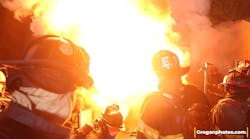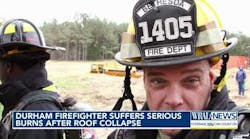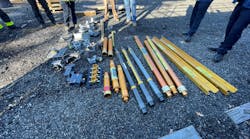Strong wind more than doubled the size of a forest fire outside Fort Yukon but the blaze remained north of the Porcupine River.
ANCHORAGE (AP) -- Strong wind more than doubled the size of a forest fire outside Fort Yukon but the blaze remained north of the Porcupine River, keeping the community out of immediate danger.
Fire officials said the Sheenjek River Fire fanned by winds to 30 mph grew from 23,500 acres early Saturday to 59,000 acres by Saturday night.
Wind diminished somewhat Sunday but inclement weather in Fairbanks kept airplanes grounded and no new assessment, said information officer Tom Kempton.
Weekend rain that doused much of the state did not reach the fire, Kempton said.
''We're in a pocket of the state that has not had any precipitation,'' he said, a situation fire officials hope will change.
However, the forecast calls for winds from the north, which could push smoke and possibly the fire toward Fort Yukon, Kempton said.
''We've been fortunate so far that the smoke has been above and blown to the west,'' he said.
The fire at just 20 acres was first noticed by a fire jumper crew returning from another fire on June 12.
By Friday, the fire had covered 15,000 acres and winds gusting to 35 mph pushed that number to 23,500 by early Saturday.
Fort Yukon, a community of about 600, is at the confluence of the Yukon and Porcupine rivers 145 miles northeast of Fairbanks.
The west flank of the fire remains eight miles from Fort Yukon, Kempton said.
Helicopters dropped water loads Sunday but the bad weather kept CL-15 fixed-wing scooper tankers from flying out of Fairbanks, Kempton said.
Crews were busy trying to stop a westerly spread of the fire. Others were working along the southern edge attempting to protect Alaska Native land allotments and cabins, Kempton said.
About 250 firefighters are working on the fire out of Fort Yukon and four spike camps. The farthest camp is two and a half hours away by riverboat, Kempton said. A dozen riverboats shuttle crews and move supplies to spike camps.
That made for a lot of river traffic Saturday as participants in the Gwich'in Gathering, an annual meeting of people in Yukon River villages, headed home. Some were traveling to Old Crow on the Porcupine River. Kempton said there were no reports of problems in river travel.
The Department of Transportation issued a travel advisory on the Dalton Highway between Miles 125-135 Miles because of poor visibility from smoke, the Fairbanks Daily News-Miner reported.
So far retardant has not been used on the fire. Retardant is banned on U.S. Fish and Wildlife lands, Kempton said, unless there's a threat to structures or human life. The other problem, he said, is that it must come from Fairbanks.
''The turnaround on that is pretty long,'' he said.





